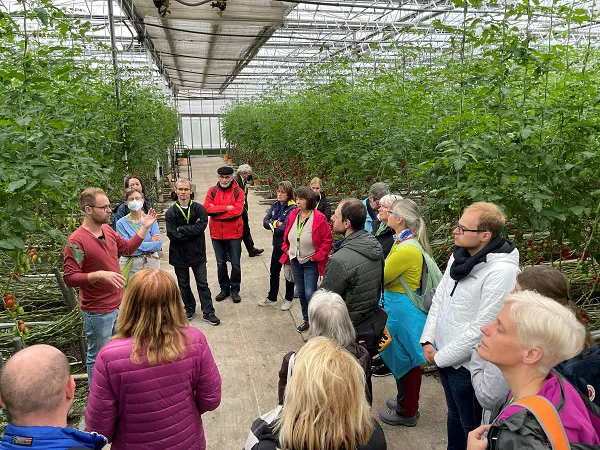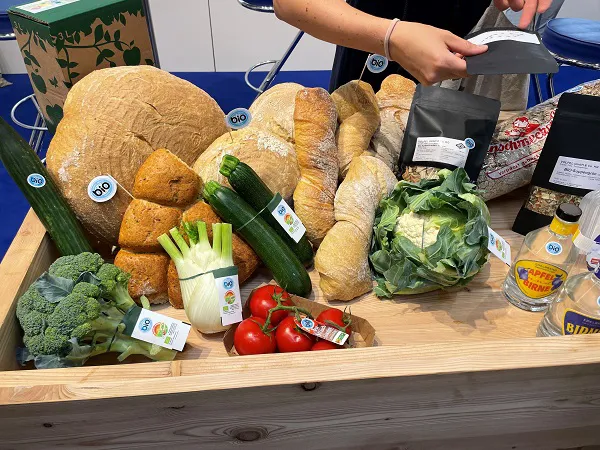In December 2020, the Franken-Gemüse Knoblauchsland producer cooperative from Nuremberg commissioned the "GemüseWert" project, which is 80% financially supported by the German Federal Ministry of Food and Agriculture. The project deals with organic regional vegetable cultivation and its marketing. We spoke with project manager and organic value chain manager at Franken-Gemüse Felix Schmidling about the project's development.
Felix Schmidling at the Biofach trade fair 2022.
"From the producer to the plate, we try to involve everyone as much as possible. We reach out to consumers, for example, through Nuremberg city tours, where 20-30 visitors at a time can come over to see the greenhouses. The aim is to show the extra work that is actually involved in organic cultivation, particularly with regard to pest monitoring and, in general, the special cultivation techniques that are required," says Schmidling.
Ten percent of total sales from organic products
The organic sector accounts for about ten percent of the total turnover of the Franken-Gemüse Knoblauchsland producer cooperative. Of the 45 production farms, 6 are focused on organic cultivation, while 2 other farms are in the conversion phase. Schmidling: "In order to provide the farms with a suitable platform for exchange, advice, pre-financing and marketing, we completed the spin-off of a separate Franken-Gemüse Bio in June 2022."
"The conversion is quite difficult in the first two years, as one has to change the fertilizers, among other things, and the soil will still have residues from previous fertilizers. Also, it is a completely different cultivation method. The marketing must also be alternated. It simply takes time to achieve safe sales. Another challenge is to be able to survive the entire season. The cultivation window is somewhat shorter than that of the conventional sector as well, which is why one has to take care of a broad range early on, or decide on a niche product," says Schmidling.

Visiting the tomato greenhouse of Patrick Lilli (Höfler GbR Bio-Gemüse), a Demeter farm. Photo: Franken-Gemüse/Felix Schmidling
Among the top sellers in the organic sector are tomatoes, greens and beets, with the latter two products offered year-round. The same goes for cress, spinach and lettuces. "We all knew that the peak in demand that prevailed during Covid could not be sustained. Organic sales figures are about 45% lower this year than they were in Covid year 2020 but still 12% higher than in pre-Covid year 2019. Accordingly, the ongoing sales growth for organic in food retail is still clearly visible."
Out-of-home catering currently difficult
Top sellers in the organic sector include tomatoes, greens and beet, with the latter two products offered year-round, as are cress, spinach leaves and salads. "It was foreseeable that the high demand that prevailed during Covid could not be maintained. Numbers are down about ten percent this year and they are in the single digits, noticeably below pre-Covid levels. Out-of-home catering in particular is proving quite difficult, although interest in regional produce has increased in this sector," Schmidling states. In order to guarantee the latter, the certificates "Geprüfte Qualität Bayern" (Bavarian Tested Quality) and the "Bayerische Bio-Siegel" (Bavarian Organic Label) are required, which indicate that both production and processing steps take place in Bavaria.
"We have known many of our producers, who are of the fourth or fifth generation, for a long time. With some of them, we have even been working ever since the cooperative has existed, i.e. since 1972. This direct line is very important to us. Also, it's important that the land belongs to the family farms and that there are no large corporations behind them."

The ALP booth at Biofach 2022.
Photo: Franken-Gemüse/Felix Schmidling.
Uncertain future
The interest is there, always. But the difficulty lies in the implementation, Schmidling says. "With municipal facilities, you are bound to certain tenders. At many vegetable farms, the readiness and willingness to convert is there. Of course, there is also a certain amount of competition for land with other farms in this area. In the future, fertilizer prices will throw up more difficulties, which is why farms are worried about potential financial hardships. However, many realize that organic farming is sustainable and provides long-term soil fertility."
"During the first two years of a conversion, one is not yet allowed to sell organic produce as such. This means that one must continue to declare them as "conventional" goods and sell them accordingly, at a lower price, although the natural food trade does purchase some of the goods as organic goods in conversion after just one year."
50th anniversary at the end of July
The Franken-Gemüse Knoblauchsland producer cooperative from Nuremberg celebrated its 50th anniversary this year, celebrating it with the managing directors, city officials, the farmers' association and the members and their families.
For more information: Felix Schmidling
Felix Schmidling
Franken-Gemüse Bio eG
Bio-Wertschöpfungskettenmanagement
Tel: 0911 93483-25
Mobile: 0151 74593894
Fax: 0911 93483-16
schmidling@gemuesewert.de
https://gemuesewert.de/
